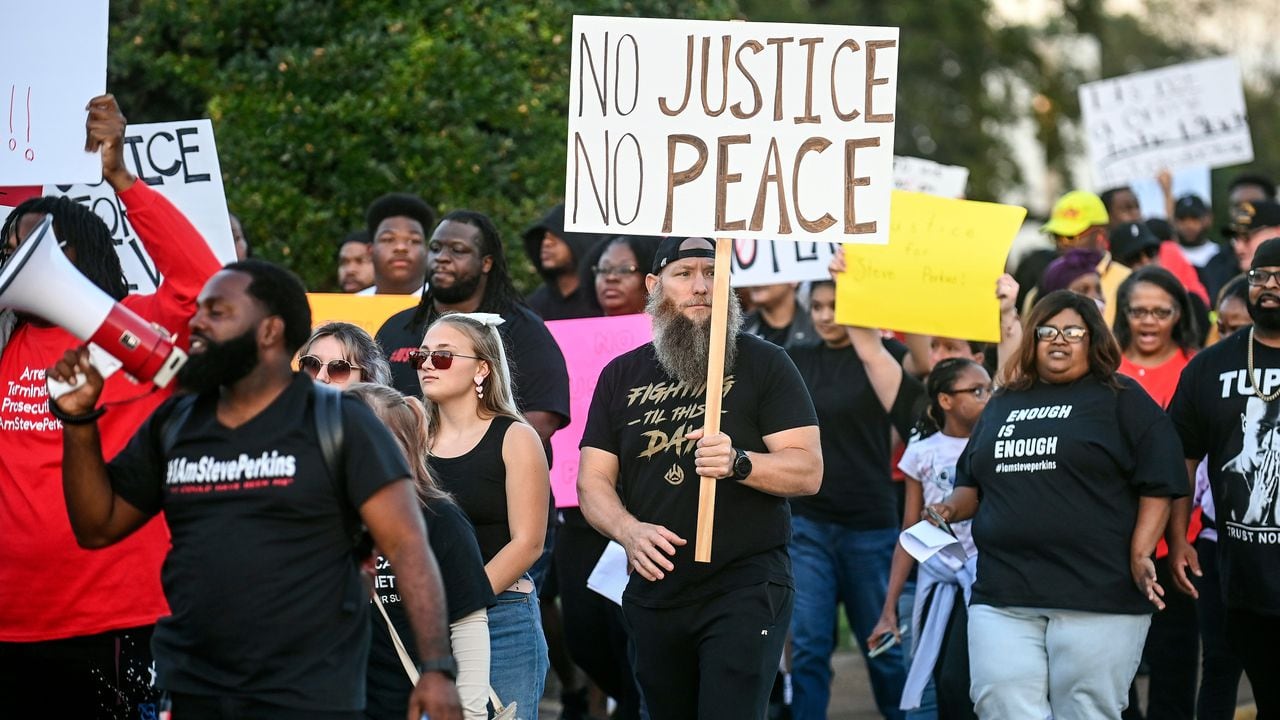Decatur canât crack down on protests because of âdisagreement with the message,â ACLU says
The ACLU of Alabama is calling for Decatur officials to stop the crackdown on peaceful protests in the wake of the police killing of Stephen Perkins.
“The City of Decatur may not regulate speech and protest because of disagreement with the message or finding the activities inconvenient,” the group wrote in a letter to Mayor Tab Bowling today.
“Therefore, those who have protested and continue to protest the police murder of Mr. Perkins do not lose their constitutional protection because their topic is potentially controversial or the City of Decatur is concerned about the public’s reactions,” the letter states.
After Decatur police killed Perkins in his front yard on Sept. 29, protesters have continued to demand justice, demonstrating each day in the city. Decatur police have arrested some protesters and charged them with disorderly conduct.
Mayor Tab Bowling announced on Dec. 28 that demonstrators must now get parade permits from the police or risk arrests following protests in his neighborhood.
In the letter, the ACLU stated that the city’s parade permit application gives too much discretionary power to the police chief. The group said Decatur should not require such a permit for stationary protests on sidewalks, for people protesting without the need for traffic management and street closure.
“The ordinance does not mention stationary protests, but the City of Decatur has indicated that it will apply this ordinance to any protest, even those that are not mobile and do not violate traffic laws,” the ACLU wrote.
The ACLU asked the mayor to consider adopting an ordinance like Nashville’s. In that city, protests on sidewalks do not require a parade permit, the ACLU’s letter says.
Mayor Bowling told AL.com in an email this morning that the city disagrees with the ACLU’s interpretation of the law. He said the city only considers the impact on the public when granting permits, not the message of the protesters.
“The ACLU has every right to express their opinion and interpretation of the law,” the mayor said.
“Our interpretation differs from theirs. To be clear, the purpose of the proposed parade is not material to the decision of whether the disturbance of the public will be allowed — in other words, when granting permits, the City of Decatur will only consider impacts to the public, not the issue or topic of the demonstration.”
The ACLU of Alabama offered to collaborate with Decatur to revise its ordinances by balancing First Amendment rights and public safety.
Protesters continue to demonstrate in Decatur, even as the city fired three officers and suspended a fourth. The officer who shot Perkins faces a murder charge.
Police shot Perkins in his front yard following an attempt to repossess his vehicle. In December, his family sued the city, the officers involved, AllStar Recovery, LLC, and Pentagon Federal Credit Union in federal court.
Morgan County District Attorney Scott Anderson, on Jan 5, announced that a grand jury had indicted former Decatur police officer Bailey Marquette for murder. Marquette is out on a $30,000 bond.
Video footage released by the family and posted to social media showed Perkins coming out of his home with a bright light at about 2 a.m. and telling the tow truck driver to put down his vehicle. In the video, a police officer appears to emerge from a dark corner near the house, shouting, “Hey, hey, police, get on the ground.” The officer immediately fired multiple rounds, the video shows.
Police said that Perkins had threatened a tow truck driver with a gun. The driver left but later returned to Perkins’ house with police.
In 2020, in Florence, a city 50 miles from Decatur, police created a protest-free zone for businesses after weeks of confederate monument demonstrations in the wake of the police killing of George Floyd.
Project Say Something, a social justice group. sued Florence in 2022. The group said the city stifled its activities when the city said their rallies fall under the city’s parade ordinance and required permits.
Project Say Something said in the federal lawsuit that the parade ordinance does not apply to stationary protests.
They accused Florence of using the parade permit ordinance to move demonstrations to a “protest zone” away from the courthouse where the Confederate monument is and threatened citations for violating the noise ordinance.
The group settled the case with Florence in September after the city enacted new noise and parade ordinances that month.
Florence’s parade ordinance now says that a parade is an activity that would require public street closure or traffic control at intercessions. The noise ordinance clarified that it does not apply to unamplified human voices.
